Re: Fed cuts dollar, Fire sales vs FIRE sales, Duh-flation, and Bezzle shrinks again - Eric Janszen
Isn't "Bezzle" a form of Snoop Dogg Speak?
http://www.ehow.com/how_2257163_talk...noop-dogg.html
I gots to get my bezzle fo shizzle.
Announcement
Collapse
No announcement yet.
Fed cuts dollar, Fire sales vs FIRE sales, Duh-flation, and Bezzle shrinks again - Eric Janszen
Collapse
X
-
Re: Fed cuts dollar, Fire sales vs FIRE sales, Duh-flation, and Bezzle shrinks again - Eric Janszen
Excellent post. Thanks.Originally posted by ASH View PostAin't that the question. I'm just a random dude, but here's my take:
My impression is that the average American (not necessarily the average iTulip reader) has little in the way of savings and few assets, other than their home. They are also encumbered by debt -- a mortgage or home equity line of credit, possibly a car loan, and probably a balance on their credit cards. The average American is working now, but probably doesn't have much job security.
If we are going by iTulip's forecast (which I would guess is understood), then we likely have several years of high unemployment, lower asset prices (such as homes and stock shares), and high inflation ahead of us. Many Americans will find themselves out of work, and most of the rest will probably face stagnant wages. The purchasing power of wages, and most forms of savings, will drop over time. At the same time, the interest rate charged on variable-rate consumer credit (variable-rate mortgages and credit cards, for instance) will go up. So, to sum it all up, the average American is going to have a lot of trouble affording the things to which he/she is accustomed. The risk of being unemployed will go up, we will be able to buy less with what we earn and what we've got saved, and we will have to pay more for what we've already borrowed.
If that is where we're going to end up, there are several things the average American can do to prepare. Employment security is a hard one, and I don't have too many ideas there. If you're in a job, now is not the time to switch employers, unless you've got an unusually secure job lined up (e.g. a full-time job in a permanent position with the federal government). If you presently have two wage-earners, start thinking about what you'll have to do if you lose one of those incomes. Managing the impact of inflation is a bit more straightforward. Lose the variable rate consumer credit; when inflation hits, your wages will not keep pace. Also, try to get in front of the inflation by frugalizing now. If the purchasing power of your wages is going to drop, then life will be a lot easier if you drop your lifestyle first -- that will give you some breathing room to adapt and adjust. This could easily mean selling unaffordable cars or down-sizing your residence. The goal is to live substantially below your means now so you can absorb the hit to the purchasing power of your income (or an interruption of that income). Finally, as regards savings -- this presents a big problem. On the one hand, if your employment is at risk, the best thing to do would be to accumulate as large a cushion of savings as possible at the same time that you are cutting your expenses to the bone. On the other hand, if consumer price inflation coincides with asset price deflation, there are few attractive places to store wealth. Obviously, some of that cushion ought to be in a regular savings account, and you'll just have to take the hit on purchasing power. However, you should attempt to protect any larger balance from erosion of its purchasing power. Here opinion is divided, because there is quite a significant degree of speculation involved. The average American is not a financial genius, so I think Treasury Inflation-Protected Securities (TIPS), while imperfect, are a reasonable lower-risk choice.
According to iTulip, the prospects for the next couple of years are, in a word, terrible.
Finally, remember that free financial advice is worth what you pay for it. I'm just some dude on the internet.
I'd like to see more posts/comments on coping strategies.Last edited by dbarberic; December 18, 2008, 09:51 AM.
Leave a comment:
-
Re: Fed cuts dollar, Fire sales vs FIRE sales, Duh-flation, and Bezzle shrinks again - Eric Janszen
I would also say that I definitely do not buy the low unemployment = deflation argument. Argentina, Mexico, and Latin American countries would be better examples than the extreme of Zimbabwe, who has a genocidal psychopath with virtually no check on his power as it's current head of state. To me unemployment has little place in the context of inflation/deflation debate.
Also, I know there are a lot of examples of severe economic contraction with high inflation.
"Is it possible to have consumer deflation with monetary supply inflation?"
My answer: Yes, it is possible.
My conclusion now that I feel like I've gotten my answer from the itulip community on this thread is that, while I still see you support ka-poom theory to the fullest, your answer is also "yes, it is possible."
Next post on deflation, I would recommend not using the word "duh-flation" - i know you try to keep it light, but that is pretty lowbrow without being that funny.
Leave a comment:
-
Re: Fed cuts dollar, Fire sales vs FIRE sales, Duh-flation, and Bezzle shrinks again - Eric Janszen
We can show you less extreme examples, but this will do to demonstrate why the association of high unemployment and low inflation is not always relevant.Originally posted by Quincy K View PostIf you are anticipating 20-25 percent U-6, which is arguably the same percentage reached at the peak of unemployment during the Great Depression, then one must also anticipate deflation as opposed to disinflation.
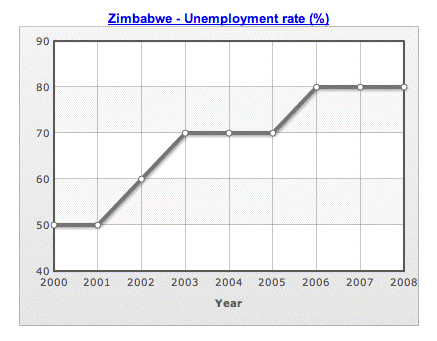
Unemployment 80%
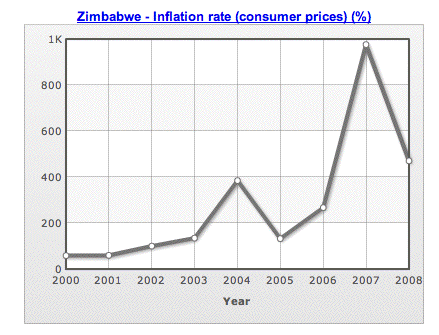
Inflation 1000%
Leave a comment:
-
Re: Fed cuts dollar, Fire sales vs FIRE sales, Duh-flation, and Bezzle shrinks again - Eric Janszen
Originally posted by FRED View PostCurrent unemployment and forecast. Source current data: Bureau of Labor Statistics. Source forecast: iTulip.com.
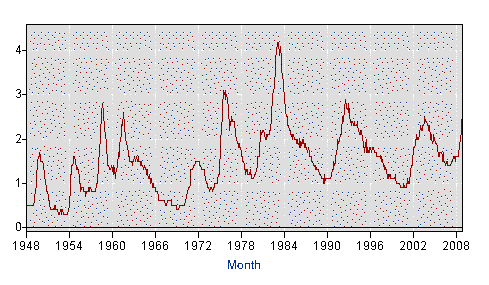
U-1 Persons unemployed 15 weeks or longer, as a percent of the civilian labor force
Current: 2.5%
2008: 3%
2009: 5%
2010: 8%
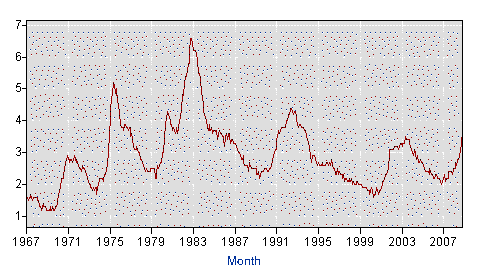
U-2 Job losers and persons who completed temporary jobs, as a percent of the civilian labor force
Current: 3.5%
2008: 4%
2009: 7%
2010: 10%

U-3 Total unemployed, as a percent of the civilian labor force (official unemployment rate)
Current: 6.5%
2008: 8%
2009: 13%
2010: 20%

U-4 Total unemployed plus discouraged workers, as a percent of the civilian labor force plus discouraged workers
Current: 7%
2008: 9%
2009: 15%
2010: 22%
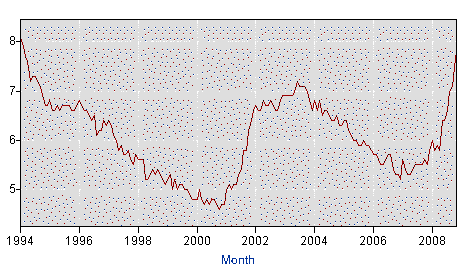
U-5 Total unemployed, plus discouraged workers, plus all other marginally attached workers, as a percent of the civilian labor force plus all marginally attached workers
Current: 7.5%
2008: 9.5%
2009: 16%
2010: 24%
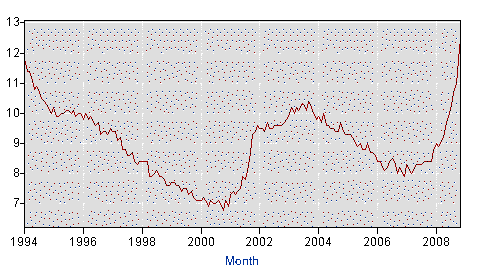
U-6 Total unemployed, plus all marginally attached workers, plus total employed part time for economic reasons, as a percent of the civilian labor force plus all marginally attached workers
Current: 12%
2008: 14%
2009: 20%
2010: 26%
See also: Housing Bubble Correction Update: Here comes the jobs crash (Part II)
If you are anticipating 20-25 percent U-6, which is arguably the same percentage reached at the peak of unemployment during the Great Depression, then one must also anticipate deflation as opposed to disinflation.
Leave a comment:
-
Re: Fed cuts dollar, Fire sales vs FIRE sales, Duh-flation, and Bezzle shrinks again - Eric Janszen
have people been forced to borrow in a deflationary environment?
Leave a comment:
-
Re: Fed cuts dollar, Fire sales vs FIRE sales, Duh-flation, and Bezzle shrinks again - Eric Janszen
None of that changes that history very consistently shows that people can be "forced" or encouraged to borrow. There are many other examples besides Weimar, which I cited as an extreme. Many were calling for a US long term deflation & crash in 2001-3 as just one other.Originally posted by DemonD View PostI'm finding comparisons to Weimar Germany fascinating, as I've come to read up a bit on that. While you or others can argue that the US is a far different case than Japan circa 1990, I can't think of a different situation for Germany in 1922. Assuming the information on Wiki is correct, I do not forsee Great Britain forcing the US to pay reparations that are greater than the sum total of all it's gold and cash reserves, plus 26% of her exports. Also, as EJ noted, hyperinflation happens when there are "tanks rolling in the streets" - which also happened with France and Belgium forcing reparations. Imagine Canada and Mexico trying to force reparations by occupying the US. I would imagine even the most tin-foilest of bunkerers out there would have a hard time seeing that as plausible. Sure, we could get a sudden stop of inflows which might lead to a similar outcome, but is there anything in your data to predict if or when that will happen?
Here is another similarity to japan and dissimilarty to Weimar: We are now at virtually zero interst rate, and while gold did rally today, commodities and prices of everything else continue to be depressed, whereas as you've pointed out, interest rates went from 7-12% in a hyperinflationary environment. The Fed has cut and cut and cut and still can't get inflation any traction. Yes, I know it takes 6-12 months for fed policy to work it's way through the economy, but if the effects of asset deflation are far greater than the fed printing machine?
Leave a comment:
-
Re: Fed cuts dollar, Fire sales vs FIRE sales, Duh-flation, and Bezzle shrinks again - Eric Janszen
I'm finding comparisons to Weimar Germany fascinating, as I've come to read up a bit on that. While you or others can argue that the US is a far different case than Japan circa 1990, I can't think of a different situation for Germany in 1922. Assuming the information on Wiki is correct, I do not forsee Great Britain forcing the US to pay reparations that are greater than the sum total of all it's gold and cash reserves, plus 26% of her exports. Also, as EJ noted, hyperinflation happens when there are "tanks rolling in the streets" - which also happened with France and Belgium forcing reparations. Imagine Canada and Mexico trying to force reparations by occupying the US. I would imagine even the most tin-foilest of bunkerers out there would have a hard time seeing that as plausible. Sure, we could get a sudden stop of inflows which might lead to a similar outcome, but is there anything in your data to predict if or when that will happen?Originally posted by bart View PostFair enough, but history shows that people can be "forced" to borrow. In Weimar Germany in 1922 for example, bank interest rates were 7% through August and only grew to 12% in November while the general price level well over tripled.
Here is another similarity to japan and dissimilarty to Weimar: We are now at virtually zero interst rate, and while gold did rally today, commodities and prices of everything else continue to be depressed, whereas as you've pointed out, interest rates went from 7-12% in a hyperinflationary environment. The Fed has cut and cut and cut and still can't get inflation any traction. Yes, I know it takes 6-12 months for fed policy to work it's way through the economy, but if the effects of asset deflation are far greater than the fed printing machine?
What I was referring to was the sum total of the itulip community, not just you guys. Although I will say your data points have pushed me away from the inflation theory more that drawn me to it - it's almost like I want to believe the inflation/ka-poom theory, but market conditions and historical antecedents just aren't adding up to it right now. Sure, gold was up a bit today, but oil busting below 40/bbl?I don't believe that EJ or Finster have changed their tune, and I haven't either. Average hard asset cycles run at least 12 years and as much as 19, and we're only 8 or so into this one.
EJ also mentioned this:
Is this not also deflationary, the destruction of wealth of the blowup of many hedge funds? Is the Fed staying out ahead of it all? So far the answer would have to be "no," of course it's the future we're predicting. I have absolutely no loyalty to any one theory, my goal is to get it right as best as I can, so now the question comes, is it possible for us to be more like Japan than the US in the 1970s?Originally posted by EJAs I pointed out back in March 2000 writing for Bankrate.com, revelations of fraud are a standard feature of all financial bubble periods. Also, financial frauds are like cockroaches, there’s never just one; you can bet millions of hedge fund investors are pouring over their investment docs this week.
I can only come to the conclusion that "yes, it is possible," the problem is that I still do see the inflationary side of the argument, and at this point am fairly paralyzed in terms of deciding which direction I think it will go. The only thing I know for SURE is that the market will be extremely volatile, and the best way to make money is short term trading in this market - which sound pretty terrifying to me, preferring the long-term outlook.
Leave a comment:
-
Re: Fed cuts dollar, Fire sales vs FIRE sales, Duh-flation, and Bezzle shrinks again - Eric Janszen
EJ puts much more time & effort into his longer term forecasts than I, partially since I'm a shorter term trader.Originally posted by BobH View PostThanks, Bart
I'm probably hoping moe like what you have posted but I'm also servicing retail so I'm seeing much worse right now. Clearly to me unemployment should be much worse than anything we have seen over the last 50 to 60 years.
And do keep in mind I'm leaving a large window open for revisions, and especially that inflation is likely to go much higher than my current chart shows.
Leave a comment:
-
Re: Fed cuts dollar, Fire sales vs FIRE sales, Duh-flation, and Bezzel shrinks again - Eric Janszen
How much of a beating can the Production/Consumption economy take before the FIRE leech kills its host?Originally posted by FRED View PostSo far it's FIRE Economy 2, Production/Consumption Economy 0.
Should I start a scoreboard here?
Leave a comment:
-
Re: Fed cuts dollar, Fire sales vs FIRE sales, Duh-flation, and Bezzle shrinks again - Eric Janszen
Fair enough, but history shows that people can be "forced" to borrow. In Weimar Germany in 1922 for example, bank interest rates were 7% through August and only grew to 12% in November while the general price level well over tripled.Originally posted by DemonD View PostThe key to the deflationists argument is that people will stop borrowing, and banks will continue to hunker down and not lend. The recent increase in savings and decrease in household debt for the first time, like, EVER, is a definite point in that direction. The question for the deflationist is can the CB's force people to borrow? And their answer is no. I tend to agree with that assessment.
I don't believe that EJ or Finster have changed their tune, and I haven't either. Average hard asset cycles run at least 12 years and as much as 19, and we're only 8 or so into this one.Originally posted by DemonD View PostAnd by the tone of everyone's posts on this thread, I am not seeing the confidence of high or hyperinflation that was apparently in the bag in 2006-2007 when gold, base metals, oil and everything else was skyrocketing. From this I can infer at least a small nudge that the itulip community (with the exception of EJ) is starting to lean against that "inflation is in the bag, gold at 5000/oz" argument.
Leave a comment:
-
Re: Fed cuts dollar, Fire sales vs FIRE sales, Duh-flation, and Bezzle shrinks again - Eric Janszen
Someone really needs to re-do the japan thing and tell me why we aren't headed for a Japan-like fall, because whether I'm just biased towards seeing this as such, everything I see here seems to be rhyming much more with japan than with other historical precedents. Because when I read a quote like this, all I can think is, it's been 19 years, why hasn't it been chased out in yen?So much money chased into treasuries (or already there before from SWFs) is bound to get chased out.
jtabeb wrote:
One thing that is evident to me is that there is no ownership of this. I remember in 2007 when that was supposedly the "stealth disinflation" when we were all looking for the "ka" phase. It would be helpful in my purview to at least acknowledge the fact that the past 6 months was a real deflation, and not just a simple disinflation, and that there was some error in the past predictions.2. Ok, then please explain Itulip's shift in position on the term Disinflation. First is was NO deflation then NO SUSTAINED DEFLATION, then it was NO SELF-REINFORCING SUSTAINED DEFLATION. That seems like more than just a symantic shift to me.
Hey, no one gets them all right, all the time.
The key to the deflationists argument is that people will stop borrowing, and banks will continue to hunker down and not lend. The recent increase in savings and decrease in household debt for the first time, like, EVER, is a definite point in that direction. The question for the deflationist is can the CB's force people to borrow? And their answer is no. I tend to agree with that assessment. However, I also know that at any given time the president could just say "we are devaluing the dollar by 50% in one day" by keeping all debts equal but digitally doubling every single demand deposit out there. This is essentially what Roosevelt did, and I believe it would be easier this time with no gold backing those dollars. Will they do that though? Are there any other tools that can be used? What I've described is essentially how I see an actual "helicopter drop" of money would work. Putting money into the P/C economy through debt finance is going to be very, very difficult if not impossible over the next few years.Originally posted by bart View PostOf course it's a point in the disinflation/deflation columns, along with many other items... but the bottom line is whether you think that the combination of governments and central banks can't and won't reverse the trend.
I am at this very moment in time completely unsure of where this is going. I used to be solidly in the "high inflation" camp, but I feel like I'm now straddling the fence between inflation and deflation, and gun to my head, I see the US dollar pulling a yen - no real extreme deflation due to monetary policy, but no inflation due to the inability to get people to borrow and lend and get that money into the p/c economy, ala japan for the past 2 decades. It's like two huge forces coming together to make this one mishmash of a scenario.
The only thing I can see is that the dollar will oscillate with much greater volatility than the yen ever did, and all markets, from bonds to fiat currencies to stocks to precious and base metals, will be extremely volatile over the medium term. In terms of a direction, I am no longer assured that high inflation is in the bag, if for no other reason that the biggest input to running the P/C economy is oil, which has dropped precipitously in terms of price in dollars.
I cannot foresee any scenario of high inflation with oil being under $100/bbl, let alone under $50 or less.
And by the tone of everyone's posts on this thread, I am not seeing the confidence of high or hyperinflation that was apparently in the bag in 2006-2007 when gold, base metals, oil and everything else was skyrocketing. From this I can infer at least a small nudge that the itulip community (with the exception of EJ) is starting to lean against that "inflation is in the bag, gold at 5000/oz" argument.
Leave a comment:
-
Re: Fed cuts dollar, Fire sales vs FIRE sales, Duh-flation, and Bezzel shrinks again - Eric Janszen
on a day like yesterday the question is always "is this the beginning of the next 1K point bear-market rally?" It's that moment of doubt that keeps you from hitting the short-button. My only regrets in an otherwise successful investing year (thanks in part to the supporting pessimism of the Itulip community) have been failing to hold on to some of my shorts the entire year and not adding considerably more gold contracts when it fell under $700 recently. Of course, unlike a fund, I simply don't have enough cash to support every idea, so some go by the wayside. Don't feel bad, if gold alone goes where we think it will, nothing else will matter!
Leave a comment:
-
Re: Fed cuts dollar, Fire sales vs FIRE sales, Duh-flation, and Bezzle shrinks again - Eric Janszen
Ed, again very much appreciated.
These unemployment numbers are far greater than any others that I have read. To be sure, you were out with very large numbers months before anyone else. We were seeing 50k or 100k type numbers when you came out with 10M will be lost in 2009. Now that we see 500+k in November your numbers seem very logical. Congrats, again!
I did notice that from your forecast it looks like you think 2010 may be just as bad as 2009. You show an unemployment increase of 5% in 2009 (i.e. 5%/8% = 62% up) and 7% increase in 2010(7%/13% =54% up)!
Holy crap ... when do you see this unemployment rocket stop it's vertical? ;)
Leave a comment:
-
Re: Fed cuts dollar, Fire sales vs FIRE sales, Duh-flation, and Bezzle shrinks again - Eric Janszen
Got my SKF: 2000 x 101.88Originally posted by c1ueOn the investing front - as expected SKF is approaching the 90s again. Very tempting, I will likely take a 1/2 share VAR stab at it tomorrow morning. I can't in good conscience take a full share stab at it because my trigger is the auto bailout - and that hasn't happened yet.
TBT is starting to look interesting, but I suspect we might see 30 before we see 40.
Leave a comment:
Leave a comment: